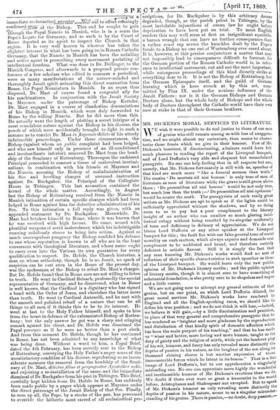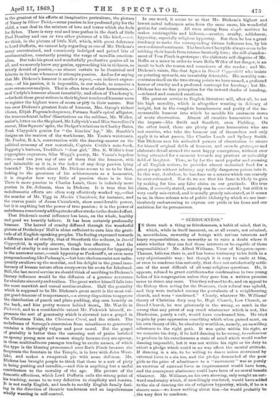MR. DICKENS'S MORAL SERVICES TO LITERATURE.
WE wish it were possible to do real justice to those of our men of genius who still remain among us with less of exaggeration, and we might almost say caricature, than seems to characterize those feasts which we give in their honour. Few of Mr. Dickens's heartiest, if discriminating, admirers could have felt much pleasure in reading the report of the Liverpool banquet, and of Lord Dufferin's very able and eloquent but unmodulated panegyric. No one can help feeling that in all respects but one, namely, that Mr. Dickens fortunately is still with us, speeches of that kind are much more " like a funeral sermon than truth." The maxim ' De mortuis nil nisi bonunt ' is only true of men of literature as men of literature while the grave is still green above them ; De presentibus nil nisi bonum ' would be not only true, but much less than the truth ;— De presentibus nil nisi optimum' would be nearer the mark. The panegyrists of such really great writers as Mr. Dickens are apt to speak as if the lights could be sufficiently appreciated without the shadows, and by so doing seem to us to pay but a poor compliment to the literary insight of an author who can swallow so much glaring intellectual eulogy without being revolted by its singular uniformity of tone and deficiency in delicacy of appreciation. We do not blame Lord 1)ufferin or any other speaker at the Liverpool banquet for this ; the fault lies with our false general tone of social morality on such matters, which always expects and demands oral compliment to be undiluted and broad, and therefore entirely deficient in artistic flavour. Still it is simply the fact that any man knowing Mr. Dickens's works would find no sort of reflection of their specific characteristics in such speeches as those of the Liverpool banquet. lie would learn only the raw public opinion of Mr. Dickens's literary merits ; and the public opinion of literary merits, though it is almost sure to have something of substantial foundation, is also pretty sure to be shapeless and vague and a little coarse.
We are not going now to attempt any general estimate of that genius, but on one point, on which Lord Dufferiu dilated, the great moral services Mr. Dickens's works have rendered to England and all the English-speaking races, we should like to define his true position ; and we do not think it will lose,—indeed, we believe it will gain,—by a little discrimination and precision, in place of that very general and comprehensive panegyric that be has rendered us "brighter and more gladsome by the reproduction and distribution of that kindly spirit of domestic affection which has been the main purport of his teaching," and that he has made us "wiser and better, more loving and more human, taught us the duty of gaiety and the religion of mirth, while yet the lambent play of his wit, humour, and fancy has only revealed more distinctly the depths of passion in his nature, as the laughter of the sea along its thousand shining shores is but another expression of those immeasurable forces which lie latent in its bosom." That is a fine image of Lord Dufferin's, but to our apprehension a singularly misleading one. No one can appreciate more highly the wonderful and inexhaustible humour of Mr. Dickens's creations than we do. We doubt if there ever were so great a humourist in the world before, Aristophanes and Shakespeare not excepted. But to speak of Mr. Dickens's humour as only revealing more distinctly the depths of passion in his nature, seems to us a singular misunderstanding of his genius. There is passion,—no doubt, deep passion,—
in the greatest of his efforts at imaginative portraiture, the picture of Nancy in Oliver Twist,—some passion in her profound pity for the child, a vast deal in the mixture of love and terror which she feels for Sykes. There is very real and true pathos in the death of little Paul Dombey and one or two other pictures of a like kind,—nos, we think, in the picture of little Nell, which, with great deference to Lord Dufferin, we cannot help regarding as one of Mr. Dickens's many overstrained, and consciously indulged and petted bits of sentimentalism, constantly passing the verge of maudlin emotionalism. But take his great and wonderfully productive genius all in all, and we scarcelyknow any genius, approaching his in richness, so utterly devoid of passion,—so almost certain to be theatrical and falsetto in its tone whenever it attempts passion. And as for saying that Mr. Dickens's humour is another aspect,—an indirect expression,—of his passion, it is impossible, in our minds, to conceive a more erroneous analysis. That is often true of other humourists,as of Carlyle's humour almost invariably, and often of Thackeray's, —for both these great writers in theirhighest touches of humour seem to register the highest wave of scorn or pity in their nature. But run over Dickens's greatest feats of humour, Mrs. Gatnp's richest idioms, Elijah Pogram's eloquence, Putnam Smif's epical alligator, the trancendental ladies' dissertations on the sublime, Mr. Weller, senior's, letter on the Shepherd, Mr.Lillyvick's and Miss Snevellicci's amour, Miss Squeers' spite, the Dodger's relations to Charley Bates, Noah Claypole's genius for "the kinchin' lay," Mr. Bumble's designs on the matron of the workhouse, Mr. Toots's waistcoats, Mr. Feeder, B.A.'s, conversation with the dancing-master on the political economy of raw materials, Captain Cattle's note-book, Peggotty's buttons, Traddles's "dear girl," Mrs. R. Wilfer's four copperplate engravers, Silas Wegg's poetry, Mr. Venus's hopeless love,—and can you say of one of them that the humour, rich and inimitable as it is, is the index of any deep passion lying beneath ? The truth about Mr. Dickens seems to us to be that, looking to the greatness of his achievements as a humourist, it is singular how very little of passion there is in him. There is more passion in Charles Lamb, there is infinitely more passion in Dr. Johnson, than in Dickens. It is true that his melodramatic efforts are often very effectively worked up,—that the murder of Mr. Tigg in Martin Chuzzlewit, for instance, and the craven panic of Jonas Chuzzlewit, show considerable power, but it is anything but the power of true passion ; it is the power of melodrama consciously addi n gstroke of ter stroke to the desired effect.
That Dickens's moral influence has been, on the whole, healthy and good we heartily believe. It has been certainly profoundly humane. The hatred of cruelty diffused through the wonderful picture of Dotheboys' Hall is alone sufficient to earn him the gratitude of all English-speaking peoples. The feeling expressed towards a different kind of cruelty, that of Steerforth the seducer, in David Copperfield, is equally sincere, though less effective. And the hatred of cruelty is not more keen than the contempt for hypocrisy in the narrower sense,—such hypocrisy as Pecksniff's, or even mere pompous humbug like Podsnap's,—but here the humourist not unfrequently swallows up the moralist, and his delight in the grand incoherency of human nature often overpowers his scorn for falsehood. Still, the last moral service we should think of ascribing to Dickens's literary influence would be the diffusion of a genuine reverence for absolute sincerity and realism. The great writer himself falls into the most mawkish and unreal sentimentalism. Half the geniality which is supposed to be Mr. Dickens's great merit is the most vulgar good-humour of temperament,—a strong disposition to approve the distribution of punch and plum-pudding, slap men heartily on the back, and kiss pretty women behind doors... Mr. Wardle in Pickwick, and to a considerable extent Mr. Pickwick himself, represents the sort of generosity which is elevated into a gospel in the Christmas Tales, the Christmas Carol, and the others. The melodrama of Scrooge's conversion from miserliness to generosity contains a thoroughly vulgar and poor moral. But the gospel of geniality is better than the caressing sort of praise lavished on spoony young men and women simply because they are spoony, in those multitudinous passages tending to excite nausea, of which the type is the blessing pronounced over Ruth Pinch because she frequents the fountain in the Temple, is in love with John \Vestlake, and makes a rumpateak pie with some deftness. Mr. Dickens has brought people to think that there is a sort of piety
being gushing and maudlin,—and this is anything but a useful contribution to the morality of the age. His picture of the domestic affections, which Lord Dufferin calls the strong point of his teaching, seems to us very defective in simplicity and reserve. It is not really English, and tends to modify English family feeling in the direction of theatric tenderness and an impulsiveness wholly wanting in self-control. In one word, it seems to us that Mr. Dickens's highest and lowest moral influences arise from the same cause, his wonderful genius for caricature. All vices arising from simple motives he makes contemptible and hideous,—avarice, cruelty, selfishness, hypocrisy, especially religious hypocrisy. But then he has a great tendency to make the corresponding virtues ludicrous too, by his over-coloured sentiment. The brothers Checryble always seem to be rubbing their hands from intense brotherly love ; the self-abandonment of Tom Pinch is grotesque ; the elaborate self-disguise of Mr. Boffin as a miser in order to warn Bella Wilfer of her danger, is an insult to both the reason and conscience of the reader ; and Mr. Dickens's saints, like that Agnes in David npperfeld who insists on pointing upwards, are invariably detestable. His morality concentrates itself on the two strong points we have named, a profound horror of cruelty and a profound contempt for humbug ; but Mr. Dickens has no fine perception for the inward shades of humbug, —relaxed and cosseted emotions.
Ills greatest service to English literature will, after all, be not his high morality, which is altogether wanting in delicacy of insight, but in the complete harmlessness and purity of the im measurable humour into which he moulds his enormous stores of acute observation. Almost all creative humourists tend to the impure—like Swift and Smollett, even Fielding. On the other hand, there are plenty of pure htunonrists who are not creative, who take the humour out of themselves and only apply it to what passes, like Charles Lamb and Sydney Smith. But Dickens uses his unlimited powers of observation to create for himself original fields of humour, and crowds grotesque and elaborate detail around the most happy conceptions, without ever being attracted for a moment towards any prurient or unhealthy field of laughter. Thus, as by far the most popular and amusing of all English writers, he provides almost unlimited food for a great people without infusing any really dangerous poison into it. In this way, doubtless, he has done us a service which can scarcely be overestimated. Nor do we see that his fame is likely to gain by making for him any false claim on our gratitude. Ilis trueclaim, if correctly stated, scarcely can be over-stated ; but still it is very easily tnis-stated, and is usually grossly mis-stated, as it seems to us, in those solemn acts of public idolatry by which we arc inarticulately endeavouring to express our pride in his fame and our ambition for its permanence.



































 Previous page
Previous page